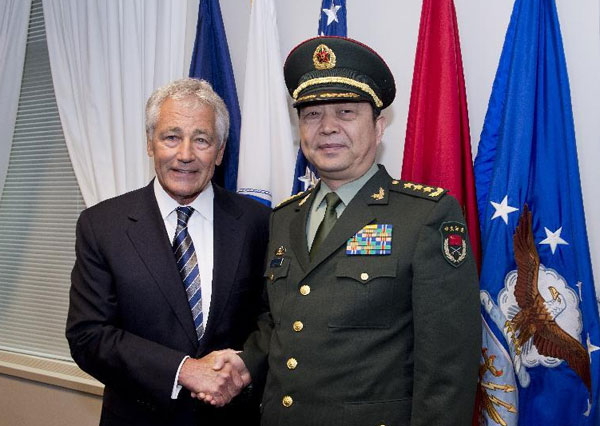China, US to enhance military cooperation
During the talks, the two sides held "candid and deepened" exchange of views over issues of common concern, and reached agreements on a number of new steps to boost bilateral military ties, Chang said.
In order to cement trust between the two militaries, they agreed to boost cooperation, expand defense exchanges and hold more joint exercises.
 |
|
China's Defense Minister Chang Wanquan shakes hands with US Secretary of Defense Chuck Hagel during their meeting in the Pentagon, on Aug 19, 2013. [Photo/Xinhua] |
Chang invited Hagel for an official visit to China next year, which the US defense chief accepted enthusiastically. Martin Dempsey, chairman of the US Joint Chiefs of Staff, also offered to host his Chinese counterpart, Fang Fenghui, next year.
Meanwhile, Chang announced that at the invitation of the United States, the Chinese navy will join the RIM of the Pacific Exercise (RIMPAC) for the first time next year.
Held biennially during June and July of even-numbered years in Honolulu, Hawaii, the US-led RIMPAC is the world's largest international maritime warfare exercise.
Also on Monday, the two militaries held a meeting in Hawaii to discuss cooperation on humanitarian assistance and disaster relief. This weekend, the Chinese and U.S navies will conduct the second counter-piracy exercise in the Gulf of Aden.
As part of the increased China-US defense exchanges, Chinese midshipmen already joined a multinational exchange program at the US Naval Academy in Annapolis earlier this summer.
Chang and Hagel also discussed other bilateral and regional security issues of mutual concern, including the situation on the Korean Peninsula, East and South China Seas, and cyber security.
In response to a media query on the US rebalancing strategy in the Asia-Pacific, Chang expressed his concern about the US emphasis on the military aspect of the comprehensive policy.
He noted that the US side has bolstered its military deployment and enhanced its alignments in the region by increasing the frequency and intensity of military cooperations and joint military drills with its allies and partners.
"From certain degree, this kind of intensified military activities further complicated the situation in the region," said Chang, expressing the hope that the US strategy does not target a specific country.
"And on the other hand, we would like to have this rebalancing strategy balanced on different countries, as well, because the essence of rebalancing is -- balance," he added.
"What is the most important is that China is ready to work with the United States to maintain the regional peace and stability," said the senior Chinese official.
Chang started his US visit on Friday in Hawaii, where he held talks with US Commander of the Pacific Command Samuel Locklear. Over the weekend, he also met with Charles Jacoby, commander of the US North American Aerospace Defense Command and of the US Northern Command, both headquartered in Colorado Springs, Colorado.





















